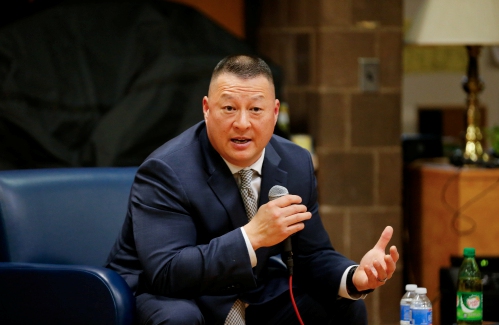Latest News

Donating hope: Survivors share stories at Northampton event as part of Organ Donation Month
NORTHAMPTON — The day before Thanksgiving in 2016, Northampton resident Bob Wood got a life-changing call — literally. A 42-year-old woman in Pennsylvania had recently died, and her liver would be a perfect fit for Wood, now 68 years old, who...

Amherst poised to hire police department veteran as new chief
AMHERST — Temporary Police Chief Gabriel Ting, who has led the department since last May and been a member of the force more almost 27 years, will become Amherst’s permanent chief, pending approval by the Town Council.Ting’s appointment to serve a...
Most Read
 South Hadley man fatally shot in attempted robbery
South Hadley man fatally shot in attempted robbery
 Smith College exhibit explores Sylvia Plath’s botanical inspiration
Smith College exhibit explores Sylvia Plath’s botanical inspiration
 Holyoke man finds bear paw in his yard
Holyoke man finds bear paw in his yard
 Guest columnist Bill Dwight: How to make sense of Northampton’s school budget dilemma
Guest columnist Bill Dwight: How to make sense of Northampton’s school budget dilemma
 South Hadley’s Lauren Marjanski signs National Letter of Intent to play soccer at Siena College
South Hadley’s Lauren Marjanski signs National Letter of Intent to play soccer at Siena College
 Deerfield residents petitioning to fix ‘dangerous’ intersection
Deerfield residents petitioning to fix ‘dangerous’ intersection
Editors Picks
 A Look Back: April 23
A Look Back: April 23
 Photos: Hangers for history
Photos: Hangers for history
 Best Bites: A familiar feast: The Passover Seder traditions and tastes my family holds dear
Best Bites: A familiar feast: The Passover Seder traditions and tastes my family holds dear
 The Beat Goes On: Album release shows by Barnstar! and Lisa Bastoni, a Young@Heart Chorus concert with new special guests, and more
The Beat Goes On: Album release shows by Barnstar! and Lisa Bastoni, a Young@Heart Chorus concert with new special guests, and more
Sports

2024 Gazette Boys Indoor Track Athlete of the Year: Nicolas Lisle, Amherst
In only his second year of indoor track and field at Amherst Regional High School, Nicolas Lisle quickly became one of the most talented runners in the state. In a sport that pushes one to their limits both physically and mentally, it leaves very...
Opinion

Guest columnist Oriel Strong: Think impossible thoughts
Mariel E. Addis’s April 17 guest column “Under siege from all sides” was heartfelt and thought-provoking. I share Addis’ foundational ethic that we must resist ranking any human being as better or worse than another. Trans and gender-nonconforming...
 Patricia Crosby: Meeting of Friends call for an immediate cease-fire in Gaza
Patricia Crosby: Meeting of Friends call for an immediate cease-fire in Gaza
 Columnist Richard Fein: National debt — A threat to our nation’s future
Columnist Richard Fein: National debt — A threat to our nation’s future
 My Turn: The pecking order revolution: Massachusetts’ fight for animal rights
My Turn: The pecking order revolution: Massachusetts’ fight for animal rights

Business

Petition to block auto dealership on King Street falters in Northampton
NORTHAMPTON — A joint meeting between the Northampton City Council’s Committee on Legislative Matters and the city’s Planning Board heard public comments on a petition to ban further automobile dealerships near the city’s downtown, an issue that...
 Flair and flavor: Couple draws on European, regional travel and food expertise to bring gourmet Aster + Pine Market to Amherst
Flair and flavor: Couple draws on European, regional travel and food expertise to bring gourmet Aster + Pine Market to Amherst
 Prices up, sales down in early spring housing market
Prices up, sales down in early spring housing market
 Area property deed transfers, April 18
Area property deed transfers, April 18
 Tea Guys of Whately owes $2M for breach of contract, judge rules
Tea Guys of Whately owes $2M for breach of contract, judge rules
Arts & Life

Speaking of Nature: ‘Those sound like chickens’: Wood frogs and spring peepers are back — and loud as ever
During a recent lecture on evolutioin I had to explain the differences between three different processes known as geographic, temporal and behavioral isolation. Geographic isolation is the easiest of these concepts to understand because it involves...
Obituaries
 Maryann Burke
Maryann Burke
Hatfield, MA - Maryann Burke (DeMatto), beloved wife, mother and Nonna, passed away on April 19, 2024, with her loving husband by her side. Maryann was born in Holyoke, MA on September 3, 1944, to the late Joseph and Emelia DeMatto. ... remainder of obit for Maryann Burke
 Crystal L. Bergeron
Crystal L. Bergeron
Crystal L Bergeron Easthampton, MA - Crystal L Bergeron, 39, of Easthampton sadly left us as she passed away peacefully at home on April 11th, 2024. She was born July 18, 1984, to Roger J Bergeron and Darlene J Bergeron. Crystal had the ... remainder of obit for Crystal L. Bergeron
 Richard A. Weber
Richard A. Weber
Richard A Weber Shutesbury, MA - In the earliest hour of Saturday, April 13, 2024, surrounded by the tremendous love of his family, Richard Weber, 60, gently left this world. Rich leaves behind an amazing group of folks who loved him wh... remainder of obit for Richard A. Weber
 Daniel James Moriarty
Daniel James Moriarty
Granby, MA - Daniel J. Moriarty, 66, passed away unexpectedly on April 14, 2024. He was born January 12, 1958 in Holyoke, MA. to the late Donald and Marie Moriary. Daniel grew up in South Hadley and graduated from South Hadley High Scho... remainder of obit for Daniel James Moriarty

 Contentious dispute ends as Hampshire Regional schools, union settle on contract
Contentious dispute ends as Hampshire Regional schools, union settle on contract
 Treehouse, Big Brothers Big Sisters turn race schedule snafu into positive
Treehouse, Big Brothers Big Sisters turn race schedule snafu into positive
 Shutesbury TM on Saturday will rule on battery storage, lighting bylaws, citizen petitions and hold elections
Shutesbury TM on Saturday will rule on battery storage, lighting bylaws, citizen petitions and hold elections
 Amherst regional district towns seek middle ground on school increase
Amherst regional district towns seek middle ground on school increase
 Prescription drug take back day set for Saturday in 15 communities in Hampshire, Franklin counties
Prescription drug take back day set for Saturday in 15 communities in Hampshire, Franklin counties
 Area briefs: Suicide prevention forum; ‘American Symphony’ screening; Zonta grant awards
Area briefs: Suicide prevention forum; ‘American Symphony’ screening; Zonta grant awards
 Senate may reform trio of consumer laws: competitive electricity, used car sales, heating oil leaks
Senate may reform trio of consumer laws: competitive electricity, used car sales, heating oil leaks
 Granby man admits guilt, gets 2½ years in vehicular homicide
Granby man admits guilt, gets 2½ years in vehicular homicide
 South Hadley residents will pay more for trash, wastewater rates next fiscal year
South Hadley residents will pay more for trash, wastewater rates next fiscal year
 Baseball: Northampton nearly comes all the way back before falling to Chicopee 15-14 (PHOTOS)
Baseball: Northampton nearly comes all the way back before falling to Chicopee 15-14 (PHOTOS) High schools: Rosie Follet, Easthampton shut down Agawam in 3-1 win
High schools: Rosie Follet, Easthampton shut down Agawam in 3-1 win Softball: Offense erupts as Hampshire Regional thumps East Longmeadow 15-3 to get back in win column
Softball: Offense erupts as Hampshire Regional thumps East Longmeadow 15-3 to get back in win column Owen Dawson notches 200th career point for South Hadley boys lacrosse team
Owen Dawson notches 200th career point for South Hadley boys lacrosse team Guest columnist Barry Hirsch: Palestinians should turn to Israel for real path to peace
Guest columnist Barry Hirsch: Palestinians should turn to Israel for real path to peace Hitting the ceramic circuit: Asparagus Valley Pottery Trail turns 20 years old, April 27-28
Hitting the ceramic circuit: Asparagus Valley Pottery Trail turns 20 years old, April 27-28 Valley Bounty: Your soil will thank you: As garden season gets underway, Whately farm provides ‘black gold’ to many
Valley Bounty: Your soil will thank you: As garden season gets underway, Whately farm provides ‘black gold’ to many Painting a more complete picture: ‘Unnamed Figures’ highlights Black presence and absence in early American history
Painting a more complete picture: ‘Unnamed Figures’ highlights Black presence and absence in early American history Earth Matters: From Big Sits to Birdathons: Birding competitions far and near
Earth Matters: From Big Sits to Birdathons: Birding competitions far and near
